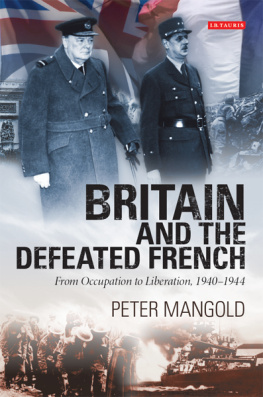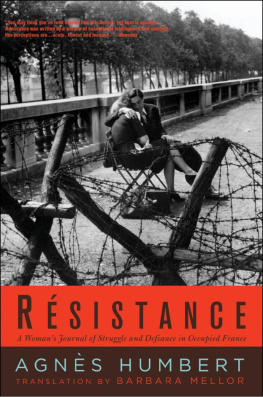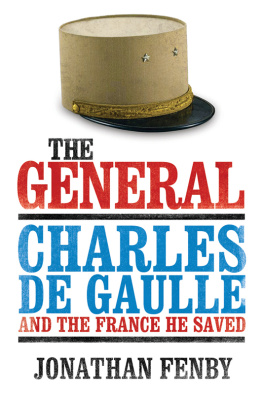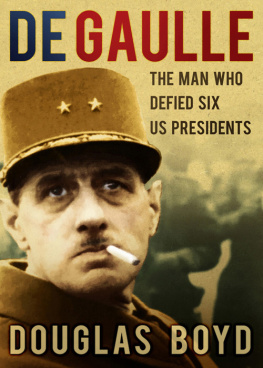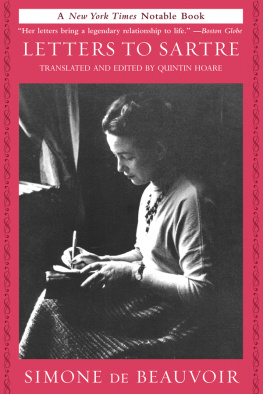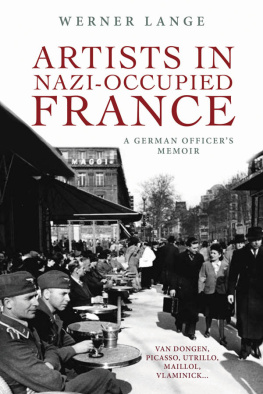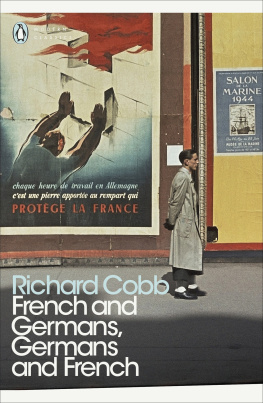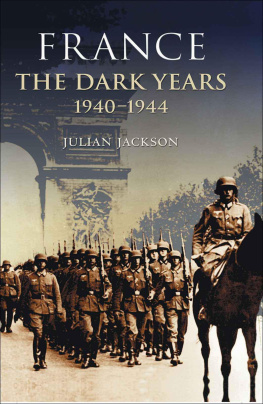Acknowledgements
My researches have been made more fruitful as well as more pleasant by the staff of the Muse de la Rsistance en Morvan at Saint-Brisson, the Muse de la Rsistance at Mussy-sur-Seine, the Library of the Institut Franais in London, the Imperial War Museum and Cambridge University Library. I owe a particular debt to Raymond and Christine Chalumeau, Xavier Debard, Maurice Raquin and Jean Renard for their patience in answering my questions. In Britain I have been helped by Annette Kelley, Anna Saunders, Mary Turner and Victoria Turner, as well as by my agent Andrew Lownie and, at John Murray, Grant McIntyre and Gail Pirkis.
EPILOGUE
Division and Its Aftermath
Im very small and weak compared to you who have the Germans to defend you. I have the French, its true, which is why Im not going to ask you to account for what you did, since they will.
Letter from Georges Mandels daughter
to Laval, 24 July 1944
Ptain was a great man who died in 1925.
De Gaulle
F RANCE LIBERATED BY her own people, with the help of the armies of France, with the help and support of the whole of France, that is to say of fighting France, that is to say of the true France, the eternal France: the vision that de Gaulle extrapolated from events in Paris and offered his audience at the Htel de Ville in August 1944 was not a flight of rhetoric meant to catch the enthusiasm of the passing moment. De Gaulles perorations were never fugitive or hasty; they all had the monumentality of granite. This one spoke to both the immediate past and the immediate future. Its reading of history implied the programme for France which de Gaulle had already started to enact.
Obviously it is not hard to challenge the Gaullist myth on its own, strictly historical, terms. France had not been liberated by France, much less by the whole of France. She had been liberated by the Allied armies, in which the French army formed only a minority, and by rsistants who though their numbers had grown as the Allied armies approached were still, as they had always been, only a minority of the French. (And rsistants , of course, were not just French: they included refugees from Spain, Germany and eastern Europe and agents from Britain, Canada and the USA.) Even this minority was as divided in its eventual goals as it had been in its tactics. And it in turn was divided from all the other minorities Vichyites and ptainistes, collabos and ultra-collabos of whatever motive or complexion who had shaped Frances experience of the Occupation and Liberation.
To offer even such a literal correction to the Gaullist myth is already to indicate the problems confronting de Gaulle. He himself combined his idealistic vision with extreme practicality, tempered his belief in la France ternelle , one and indivisible, with a realistic estimate of her present state. Even as he led the parade down the Champs Elyses toward Notre-Dame the day after his speech at the Htel de Ville he knew, so his memoirs would record, that rival ambitions as well as devotion kept pace with him. Cest la mer! he exclaimed of the crowds who cheered, finding in the sea of people the living embodiment of Frances unity but still laconically noting that the reefs of politics remained visible.
Even the thanksgiving service at Notre-Dame itself confirmed his wary instincts. Machine-gun fire was heard as he entered the cathedral and more shooting broke out when he was inside, making much of the congregation dive for cover, though he himself characteristically remained, in the words of one admiring witness, standing, alone, in full view at the throne of kings. At the time nobody could identify who fired the shots, and historians can still only report the various rumours which clustered round the incident. Germans or ultra-collabos making a last defiant gesture? Quite possibly, for despite the agreement between commanders street-fighting was still going on. Communist rsistants staging a coup? Unruly rsistants making their dissatisfactions known? In such fragile and dangerous times those possibilities could not be discounted either.
When the service did go ahead it was not conducted by the appropriate cleric, despite de Gaulles deep respect for protocol. Monsignor Suhard, Cardinal-Archbishop of Paris, had made his sympathies too publicly known during the Occupation: blessing and absolving men of the Lgion des Volontaires Franais on their way to fight with the Wehrmacht on the Eastern Front, welcoming Ptain on his single visit to Paris in April 1944 and, most recently, officiating at Henriots funeral in the very cathedral where de Gaulle now stood. He later wrote Suhard a letter blandly disclaiming any personal antagonism but, on the day of the thanksgiving service itself, armed police firmly kept the Monsignor out of the way in his archepiscopal palace.
Disaffected rsistants on the one side and tainted collabos on the other, both required a firm hand. Nothing can be done except through order, de Gaulle insisted: Nothing and, above all, nothing great can be done except through order. Special times demand special measures, special times justify special powers. Ptain had told the French people much the same thing in 1940, but he had had the Germans to back him up and even then he had never quite succeeded in gaining the unquestioning obedience he sought. And what authority, really, did de Gaulle now possess? For all his popularity and his triumph in Paris, surely he was just (as one of the unconverted bluntly put it) the provisional head of a provisional government of a provisional republic? Cline had called Ptain Philippe le Dernier : people were soon calling de Gaulle Charles le Temporaire.
It was typical of de Gaulle that he had equipped himself not just with a vision of la France ternelle but with a constitutional argument as well. He had been advancing it since the early days of his flight to Britain in 1940, always feeling the need for more than the proof of rhetorical grandeur or lonely courage to justify his stand. In his eyes the Third Republic had never ceased to exist, and he was now the caretaker best qualified to put it back into working order. This was why, surprising and even disappointing some of his audience, he had not proclaimed the restoration of the Third Republic at the Htel de Ville as the maquisards on the Vercors plateau, for example, had thought it necessary to do in July. Its restoration did not need to be proclaimed. The Third Republic had always been there because Ptain had acted illegally and unconstitutionally in everything he had done: in forming a cabinet with the sole purpose of seeking an armistice and in founding the Vichy state with powers that the National Assembly had no right to grant him. He had staged a coup dtat and led a government without rightful claim to power or obedience.
Their attitudes to the Republic had always marked a critical difference between de Gaulle and Ptain. Indeed, they underlined the critical difference between the two, ultimately no mere question of constitutional law but a fundamental matter of loyalty and temperament. Otherwise, cynics might say, they bore a disconcerting resemblance to one another. Both were soldiers who rose to power in a time of crisis and achieved power by popular acclamation. Both, in soldierly fashion, lectured on the need for order and professed disdain for sectarian politics. Both claimed to represent France without being elected by the French; both, indeed, virtually claimed to be France. Yet where Ptain was the last and most powerful enemy of the Republic, de Gaulle was its last and most powerful ally. In his speeches he could, and did, endow the words la Rpublique with as much resonance as la France. After four years filled with the voices of autocracy and revolution, at a time when those voices had not yet been stilled, his insistence on la Rpublique reassured fears (which his manner did not always put at rest) that he was just another autocrat, another revolutionary, another opportunist soldier taking advantage of the moment. He was there to defend the essential continuity of French government and that was, at least, the most tangible part of la France ternelle.


